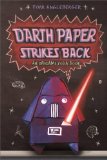Review of Darth Paper Strikes Back, by Tom Angleberger
by Tom Angleberger
Amulet Books, New York, 2011. 159 pages.
Starred Review
Darth Paper Strikes Back is, naturally, the sequel to The Strange Case of Origami Yoda. Both books are fabulous middle school reading. I so wish I could ever find them on the shelves of the library, because there are many customers I would recommend them to — but so far, they are always checked out.
The first book covers Tommy’s sixth grade year, where he gets surprisingly wise advice from Origami Yoda, a finger puppet manipulated by a really weird kid called Dwight. The advice solves all kinds of problems and is far too wise for Dwight to have made up on his own. But all along, there was a skeptic, a kid named Harvey who scoffed at everyone else’s belief in Origami Yoda.
On the first day of seventh grade, Harvey shows up with an origami finger puppet of Darth Vader. And Harvey does Vader’s voice much better than Dwight has ever done Yoda’s voice. And then things get bad for Dwight.
Tommy explains the scenario at the beginning of his latest “case file”:
“The bad news is that this year Origami Yoda’s up against the destructive force of Darth Paper, and can’t seem to handle it.
“It has all gone wrong since that first day. Now it’s October and Darth Paper has pretty much destroyed all the good Origami Yoda did last year. Now the girls don’t like us. The teachers don’t like us. Some of us don’t even like each other….
“But it’s been worse for Dwight. He’s been suspended from school, and the school board is going to decide if he should get sent to CREF — the Correctional and Remedial Education Facility — the school where they send the really, really bad kids, which Dwight isn’t. Amy’s older brother said the toughest, meanest, nastiest guy in his class was sent there . . . and got beat up! It’s kind of like Jabba’s palace, except without the alien rock band.
“This would be the ultimate defeat for Origami Yoda! And we think that Darth Paper is behind it. I just find it hard to believe that even Darth Paper/Harvey could be so evil!”
Tommy’s case file consists of telling about the good influences Origami Yoda has already had this year, the good advice he’s given, the situations he’s saved. I love the way these are real middle school concerns — like a game to play when they take video games off the library computers, helping Lance to decide which class to take, a way to clean up on the school popcorn sale, and even telling Murky the secret origins of Yoda that are not revealed in the movies. And, yes, there’s a return of Mr. Good Clean Fun and Soapy the Monkey, but this time he’s encouraging participation in the popcorn sale, rather than teaching them to wash their hands. (You see, the background situation of the middle school has some wonderful humor, too.)
Now, I was halfway through the book, wistfully thinking of how in the first book, the kids learned through the adventures that Dwight was a pretty great person after all. But in this book, Harvey just seemed bad clear through. I also thought it pretty unrealistic that a school board would listen to a bunch of students about a disciplinary matter, so Tommy’s whole case file seemed awfully misguided and unrealistic.
Then I read the ending, and I will just say that Tom Angleberger nailed it! Best of all, we’ve got a picture of Yoda at the back, promising “The End… This is Not!”
Did I mention that, like the Wimpy Kid books, this book has cartoons throughout? Personally, I like these books better. They feel more good-hearted to me. Sure, Harvey’s mean, but there’s not much bullying going on, and these seem like genuine middle school kids with middle school concerns. So I really hope our library will get more copies before long, so I can direct those who like the Wimpy Kid books to turn to Origami Yoda next. Now, admittedly, people familiar with Star Wars will enjoy it a lot more. I could be wrong, but isn’t that pretty much all middle school kids?
origamiyoda.com
amuletbooks.com
Find this review on Sonderbooks at: www.sonderbooks.com/Childrens_Fiction/darth_paper_strikes_back.html
Disclosure: I am an Amazon Affiliate, and will earn a small percentage if you order a book on Amazon after clicking through from my site.
Source: This review is based on a library book from the Fairfax County Public Library.

